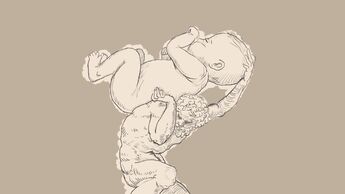
“Without easy access to abortion, society would not be able to cope with all the additional lives being born. There are already too many unwanted children in the UK, so without abortion services, it would put tremendous strain on the care system and lead to increased suffering as a result.”
This is a common argument made in favour of legal abortion – one that appears to be both pragmatic and compassionate. It’s sometimes espoused by those who oppose abortion in principle, but who see insurmountable barriers in social and political structures — structures that are simply not set up to provide for unwanted pregnancies.
Yet this argument is deeply flawed. Here are 5 key reasons why it does not justify the continuation of legalised abortion:
1. We should be more concerned about the current shortage of births in the UK
This is an increasingly serious issue that policymakers need to tackle for the future of our society. The birth rate is too low and continues to decrease. In England and Wales in 2019 it dropped down to 1.65 children per woman. Fertility rates for those under 30 were also at the lowest level since records began in 1938.
As I explained in this article, this is a serious shortfall. We need a birth rate of around 2.1 children per woman in order for society to sustain itself. If there is demographic inequality and an ageing population, this leads to lower GDP, a shortage of people to care for the elderly, and services being overrun. This is the dilemma currently being faced by countries such as Japan, and these governments are having to introduce family-promoting policies to encourage the birth rate to increase.
The question we should be asking, therefore, is how is society going to cope with so few lives being born? It is absurd to suggest that abortion is necessary because we are currently 'overwhelmed' with babies to care for. Abortion is a key factor in the declining birth rate in this country, and as it continues to decline we will find ourselves facing a growing demographic crisis.
2. It suggests abortion is a form of population control
This argument is rooted in fears about overpopulation. Abortion is therefore a means of population control: it advantages society by ensuring support services are not put under too much strain, and that resources can be evenly distributed.
This ideology was prevalent in the early part of the 20th century, derived from the ideas of economist Thomas Malthus. Malthus argued for checks on the population to save humanity from itself and avoid human misery, particularly for the ‘lower classes’ of society.
Alongside fears around overpopulation, there was a rise in the popularity of eugenics — where population planning and checks could be put in place in order to create a master race and rid society of ‘undesirables’.
It is no coincidence that many of the founding members of the Abortion Law Reform Association, the group that successfully campaigned to change the law, were also members of the Eugenics Society. Similarly, in the US, it was Larry Nader (a proponent of Malthus) who convinced Betty Friedan to adopt abortion as one of the key aims of the Women’s Movement.
Abortion has an intimate history with population control, and we don’t have to look far into the pastor around the world today to observe how such methods can lead to considerable social problems and increased human suffering. In its current form, this way of thinking has led to a movement known as anti-natalism, where having children is almost viewed as immoral, due to the environmental impact of each human life.
Of course, the real problem with this ideology is that it treats people like a cancer on the earth that must be controlled or eradicated. Whilst it appears to be in the interests of society and the ‘greater good’, it ultimately devalues humanity and people become nothing more than numbers, resources and costs.
I’m not suggesting that anyone who raises this concern is necessarily a proponent of this view; I merely want to point out this line of argument has a troubling notion of the value of the human person, and it has been used in the past for insidious ends.
3. Abortion is not a solution to social problems
This year the numbers of children in care reached a 10 year high in England and Wales. Of course, this fact could be used as fuel to the argument that we therefore ‘need’ abortion to ensure there are no more children added to this number. But, crucially, it demonstrates that legalised abortion has not somehow ‘solved’ the fact that children continue to be placed in care at tragically high rates. The pro-choice claim that abortion makes 'every child a wanted child', is demonstrably false.
Abortion is not a solution: it has not solved poverty and it has not solved inequality. In fact, abortions occur disproportionately amongst those in lower income brackets, suggesting it is a symptom of inequality, rather than a solution to it.
4. Children who are brought up in care have lives worth living
This view also perpetuates the idea that somehow a child who is ‘unwanted’, or grows up in the care system, is somehow destined to a terrible life. At worst, this idea suggests that these children would be better off dead.
Whilst no one can detract from the unique suffering experienced by children who are placed in care, these circumstances in no way mean their lives are less valuable or that they are destined to a life of misery.
Many testify to the quality of life they have found despite these barriers. We ought to listen to these voices rather than treating them as a homogenous group, making sweeping assumptions. To suggest that it would be better for such persons to be aborted is deeply wrong. It treats them as burdens, rather than valuable members of society.
5. It misses the point at the heart of the abortion debate.
Whilst this argument is practical, and it claims to be in the interests of preventing suffering, it completely misses the point.
Every abortion extinguishes a person. Even if many additional lives would create an added strain on society, when does that concern ever justify killing someone? Underneath this argument is an assumption about the personhood of preborn babies and the value of their lives. If we can demonstrate that the preborn baby is a person, then this argument fails.
In many ways, this argument is similar to justifications for assisted suicide and euthanasia. It takes an overly pragmatic approach that, at times, is callous and views people as a drain on resources — such as those who argue that the NHS would save money if it didn’t have to provide palliative care, and instead much cheaper barbiturates could be used to euthanise patients.
Yes, our social care system is overrun and it needs improving. Some would say it is broken. So what do we do? We keep striving to fix it. There are undoubtedly practical issues and barriers to a pro-life society, but the point is that even if this premise is correct — that society would suddenly become overwhelmed with additional lives — we have no excuse not to care for such people.
Many argue that pro-lifers only care about babies before they are born, but evidence suggests otherwise: there are hundreds of Christian charities providing care for people in many different ways, and there are many pro-lifers who adopt and foster children. In fact, it’s an essential part of the Christian faith to care for our neighbour in this way. The idea that a pro-life world would leave children to suffer is totally antithetical to the pro-life view.
Redemption is possible
What this argument ultimately misses is any belief in redemption, for both ‘unwanted’ child and for their mother. If abortion did not masquerade as an easy option, women might make other choices — choices that ultimately provide an experience of love.
This was highlighted in an article in The Atlantic, where a study looking at women who were unable to get abortions in the US found that many women who continued with their pregnancies actually chose not to put their child up for adoption. By the time they were delivering the child, they felt bonded to their babies.
As the article’s author comments, “Some of these women report feeling bonded with their fetuses, or at least too attached to give up the resulting baby. That’s an inconvenient point if you feel that a fetus is nothing more than a collection of cells, and that what happens to it before viability is basically immaterial.”
A preborn baby is a person, and we as communities should ensure both mother and baby are supported and able to flourish. As the saying goes, it takes a village to raise a child, and our society — riddled with the toxicity of individualism — must take responsibility for those who need our help. We must stop hiding behind such arguments, claiming we are avoiding suffering and promoting interests of mother and baby. We’re doing neither.


Share story
In a world without abortion, how would society cope with all the extra lives?